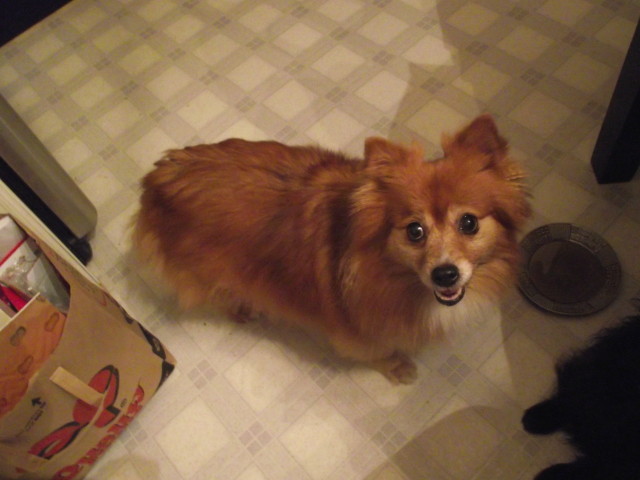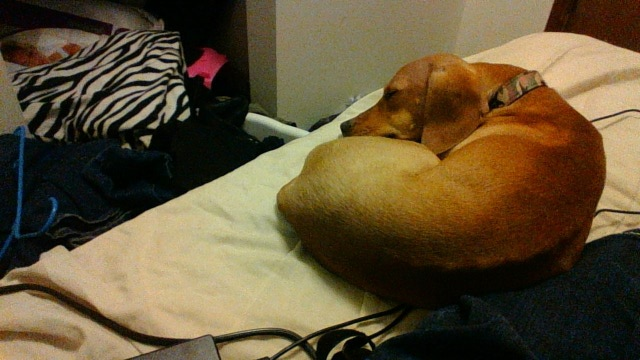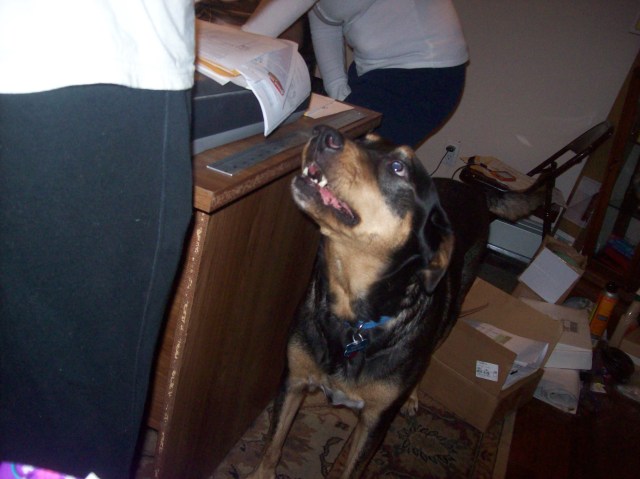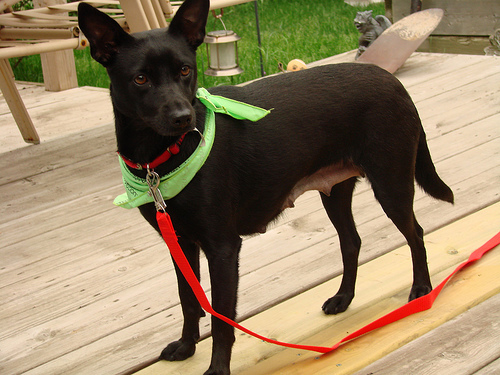QuestionI have an 8 year old Coton De Tulear girl and the poor thing is having some real anxiety issues and I have no idea what to do. I have read some various sites about treating the problem, but cannot really find something I could successfully implement (more on that later).
The cause is clear: I moved to a new house recently, so the neighbourhood is all new. What adds to the problem is the fact that my dog is from now on separated from one of the family members who she loved the most (that is unfortunately unsolvable).
Her symptoms are basically shaking and panting, but the patterns are rather weird. Excuse me if there is too much detail in it, but since the problem is behavioural, I'd rather give a lot of information:
- She doesn't exactly start to panic before I and my husband leave for work, she cries a bit after I close the door, but that's it. She doesn't do anything bad while we are away, either.
- After I come back, she jumps at me like crazy and immediately runs to her bowl to drink: I see she hasn't touched her food nor water, so I can assume she has been panting like that since I was gone without touching her drink.
- After her afternoon walk etc she still is panting, but less rapidly, she is willing to play and so on. If only one of us (me or my husband) are home, she bascally starts getting nervous after an hour again. She only calms down fully when we are both at home, but that doesn't last long because:
After her last walk in the late evening (she behaves absolutely normally then), she comes back home and immediately starts nervously panting and shaking rapidly. She will come to the door and start crying and/or seek attention.
As for treatment...
We tried some mild meds from the vet (Hydroxyzini hydrochloridum) but they do not work. The only way to solve the problem quickly is to let her sleep on the bed with us - she calms down in a matter of minutes then.
Having said all that, I am wondering how to help my little girl. I would rather not give her any more medication (she already gets a lot of meds for her hypothyroidism and kidneys)
My problem here is that I work full time, and there are absolutely no chances of hiring a dog-nanny nor gradually leaving my dog a few minutes at a time... I have t leave her for 9 hours per day from Monday to Friday.
I don't think doing these exercises after work would really be successful after all the stress she had during the day. Moreover, since she starts crying even though we are IN the house, it is not only about separation from us, right?
Would you have any thoughts on my problem? I would greatly appreeciate any ideas...
- Marta
AnswerThis is a tough one. Maybe some of the confidence building and bonding exercises that I suggest for other problems would work.
Start with obedience training. The key to most behavior problems is approaching things using the dog's natural instincts. Dogs see all the people and dogs in the household as a pack with each having their own rank in the pack and a top dog. Life is much easier if the 2 legged pack members outrank the 4 legged ones. You can learn to play the role of top dog by reading some books or going to a good obedience class. A good obedience class or book is about you being top dog, not about rewarding standard commands with a treat. Start at http://www.dogsbestfriend.com/ As you praise the dog for following your commands, it will build its confidence.
Play tug of war with the dog and lose. However at the end of the game, take the rope or toy and put it up, less the dog becomes confused about who is top dog. Ropes from the pets' store quickly turn to hazardous shreds. Ones I made lasted much better. Go to a hardware or home center that sells rope by the foot. Buy 2' of 3/4" poly rope. Melt the ends, and tie knots in it. Get them as tight as possible, put it in a vise and pound it with a hammer. Watch carefully, and be ready to discard when it comes apart.
Finally, make sure it has a den to live in. If you are not using a crate, buy one. The dog may be happier in its den than loose in the house. It relaxes, it feels safe in its den. It rests, the body slows down reducing the need for water and relieving its self. Dogs that have been crated all along do very well. Many of them will rest in their crates even when the door is open. I think the plastic ones give the dog more of a safe, enclosed den feeling. Metal ones can be put in a corner or covered with something the dog can't pull in and chew. Select a crate just big enough for the full grown dog to stretch out in.
''Elevation for small puppies: Sit on the floor and gently put your hands around your pup's middle, below his front legs, and lift him up. He is facing you. Hold him for 15 seconds. Repeat until he no longer struggles. If he is past 10-12 weeks, lift his front feet off the ground, but don't pick him up.
Cradling for small puppies: Hold your puppy gently on his back, as you would cradle a small baby. If he struggles, hold him firmly until he quiets for 10-15 seconds. With larger pups, you can do this as your sit on the floor, with your pup between your legs.
Quiet lying down: Place your pup on the floor on his side, with all 4 legs pointing away from you. Use your hands on his neck/shoulder area and middle, to hold him in this position. When he is quiet, praise him. Lengthen the time that you keep him quietly in this position. When he accepts this position well, handle his paws and muzzle, while keeping him quiet.''
The quotes mean this isn't my original work. It is copied from my Puppy Raising Manual. I have long used these or minor variations of them, and they are very effective. You may want to give him a belly rub while he is on his back too. Helps bonding. There is a big difference between him rolling over and demanding a belly rub, and you choosing a time to roll him over and rub his belly. The latter cements your place as pack leader.

 Pomeranian or Pomeranian mix
Question
Brandy my Pomeranian
Hi I have a Dog na
Pomeranian or Pomeranian mix
Question
Brandy my Pomeranian
Hi I have a Dog na
 2 Year Old Dachshund Rescued From Probable Bad Situation
Question
Nelson Nelson
Hi there! I recentl
2 Year Old Dachshund Rescued From Probable Bad Situation
Question
Nelson Nelson
Hi there! I recentl
 old age dog
Question
he was barking!
I have a Dog who is a german s
old age dog
Question
he was barking!
I have a Dog who is a german s
 cockapoo agression
Question
Pets11.jpg
We have had our Cockapoo (Tyson) si
cockapoo agression
Question
Pets11.jpg
We have had our Cockapoo (Tyson) si
 Guessing my dogs mix
Question
matilda
I was wondering if you could help what
Guessing my dogs mix
Question
matilda
I was wondering if you could help what